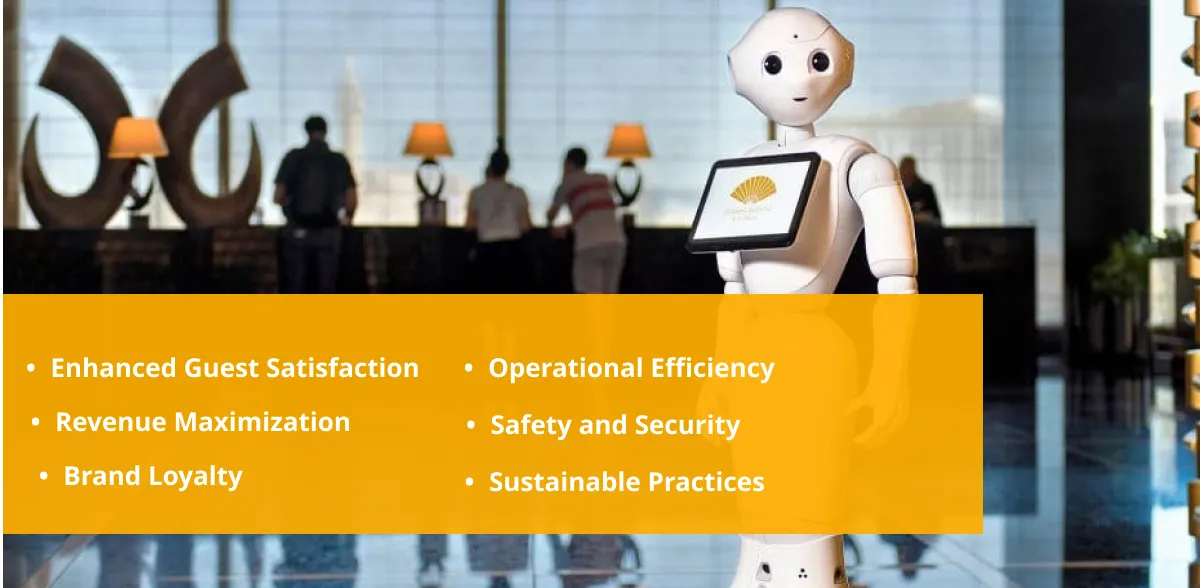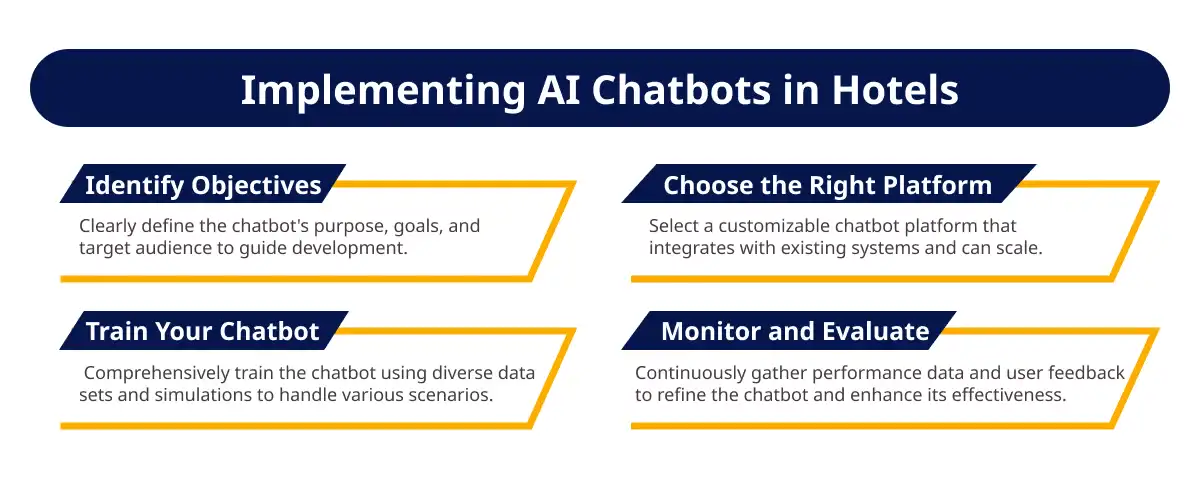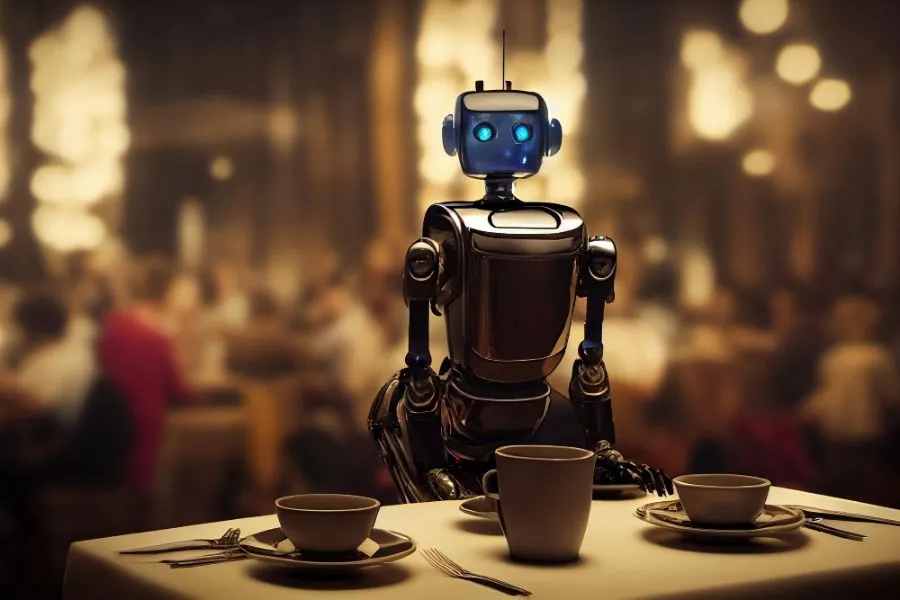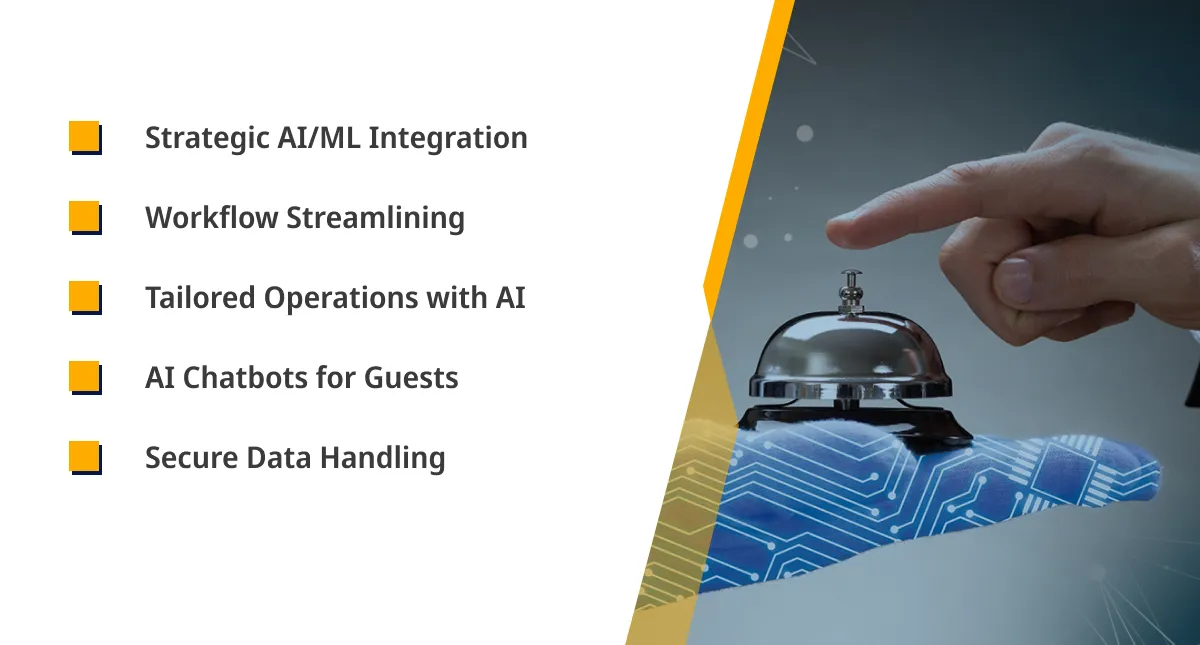Boost your hospitality business with our custom AI/ML solutions for the hospitality sector. We help you boost customer experience, operational efficiency, and employee productivity with advanced tech. Explore the possibilities of AI solutions for the hospitality industry and elevate your business to new heights.
Improve the guest experience in your hospitality business with our tailored AI/ML solutions, designed to boost satisfaction and set your brand apart as a leader in customer service. Explore the possibilities of AI services for the hospitality industry, ensuring a seamless and personalized experience for your guests.

Tailor guest experiences with our AI-driven solutions, offering personalized room preferences, dining recommendations, and activity suggestions based on individual behaviors and preferences.
Optimize your pricing strategy and staffing decisions with our AI-powered demand forecasting, revolutionizing the hospitality industry. Elevate your business with precise inventory management and strategic pricing.
Enhance customer engagement with our AI chatbots on your hotel website and apps. Streamline bookings, address queries, and provide local insights instantly. Elevate your customer service with our cutting-edge AI chatbot for hotels.
Experience efficiency and novelty with our AI hospitality solutions for automating room service orders and deliveries. Integrate robotic systems to elevate service standards and optimize operational efficiency.
Ensure secure access and offer personalized services with our facial recognition technology. Elevate guest experiences with advanced security features using AI in the hospitality industry.
Optimize energy consumption effortlessly with our AI solutions. Automatically adjust lighting, heating, and air conditioning based on occupancy and weather conditions, providing sustainable solutions for the hospitality sector.
Efficiently schedule and track maintenance and housekeeping tasks with our AI systems. Ensure optimal resource allocation and heightened guest satisfaction through streamlined processes.
Transform guest experiences with voice-activated AI assistants in rooms. Control features, access information, and make service requests effortlessly, setting new standards in the AI in hospitality sector.
Efficiently manage inventory with our AI solutions, predicting supply needs and automating ordering processes. Elevate operational efficiency and reduce costs with our tailored solutions.
Protect your business with our AI-powered fraud detection system. Detect and prevent fraudulent transactions in bookings and payments, ensuring the security of your financial transactions.
Revolutionize staff training with AI simulations of customer service scenarios. Manage staff schedules based on predicted demand, ensuring optimal performance in the hospitality industry.
Address unique challenges or innovate in the hospitality sector with our custom AI/ML solutions. Tailored to your specific needs, we provide cutting-edge technology solutions for the AI in hospitality industry.
Discover how ValueCoders can help you implement revenue optimization strategies through AI and ML


AI for Hospitality involves leveraging artificial intelligence and machine learning to enhance various aspects of the hospitality industry. This includes personalized guest experiences, predictive analytics for demand forecasting, and operational efficiency.
According to a report by Wemarket Research, the global AI in the hospitality market was valued at USD 90 million in 2022 and is estimated to grow at a CAGR of 60% between 2023 and 2033, indicating the growing significance of AI in transforming the hospitality sector.
ValueCoders, a leader in AI solutions for hospitality, is committed to delivering innovative technology solutions for improved guest satisfaction and operational excellence.

From enhancing personalization to optimizing revenue, AI/ML redefines how hotels and hospitality businesses operate and engage with their guests. Explore the transformative impact of AI in hospitality, revolutionizing the industry and elevating guest experiences to new heights.

In the competitive world of hospitality, effectively maximizing revenue is crucial. AI-driven pricing strategies provide a dynamic and sophisticated approach to pricing hotel rooms and services. Here’s how to leverage AI for optimal pricing, detailed in a more readable, bulleted format:

AI chatbots are transforming the hospitality industry by revolutionizing customer service, making interactions more efficient and guest-focused. Here is a detailed, step-by-step guide to effectively implementing AI chatbots in hotels:

AI hotel software are revolutionizing the hospitality industry by enabling hotels to offer unique, tailor-made experiences to their guests. Let’s look at the details on how hospitality professionals can understand and implement Artificial Intelligence for hotels, specifically focusing on AI-driven personalization:
By understanding and implementing AI-powered personalization, hospitality professionals can significantly enhance the guest experience, leading to higher satisfaction levels, increased loyalty, and a strong competitive edge in the AI in hospitality industry.
Incorporating AI into room service operations can significantly elevate the guest experience by enhancing efficiency and customization. Here’s a detailed guide for hospitality managers on how to navigate artificial intelligence for hotels in room service automation:

Predictive maintenance, powered by machine learning (ML), is becoming increasingly vital in the hospitality industry. It helps reduce operational costs and significantly improves the guest experience by preventing unexpected equipment failures. Here’s a detailed explanation of utilizing AI in hospitality for predictive maintenance:
Leveraging ML for predictive maintenance in the hospitality industry is not just about preventing equipment failures; it’s about creating an environment where guest comfort and satisfaction are consistently upheld through smart, data-driven operational decisions.
Check our blog on Top Data Engineering Companies.

In the dynamic hospitality industry landscape, integrating Custom AI/ML Solutions with Existing Systems and Workflows is crucial for staying competitive and enhancing operational efficiency. This comprehensive guide delves into the intricacies of incorporating tailored artificial intelligence and machine learning solutions within the established frameworks of hotels.
Key Components:
Ans. Choosing ValueCoders for your AI hospitality solutions ensures you partner with experts who have a deep understanding of both technology and the unique needs of the hospitality sector.
Our team not only brings advanced AI/ML expertise but also a commitment to delivering personalized, scalable solutions that enhance guest experiences and operational efficiency.
With our proven track record, innovative approach, and dedicated support, we ensure your transition to AI/ML is seamless, secure, and strategically aligned with your business goals.
Ans. AI/ML hospitality solutions can personalize guest experiences by tailoring services such as room preferences, dining, and entertainment. They also streamline operations like check-in/out processes and provide real-time customer support through AI chatbots.
Ans. Implementing AI requires data such as guest preferences, historical booking information, service usage patterns, and feedback.
The more comprehensive the data, the more effective the AI solutions will be in personalizing guest experiences and optimizing operations.
Ans. Yes, AI/ML solutions are a cost-effective way to enhance guest satisfaction and operational efficiency. They can automate routine tasks, provide valuable insights for decision-making, and help in resource optimization, all of which can lead to cost savings in the long run.
Ans. Absolutely. AI/ML can analyze guest data to develop targeted marketing strategies. This includes personalized offers and promotions based on guest preferences, leading to higher engagement and conversion rates.
We are grateful for our clients’ trust in us, and we take great pride in delivering quality solutions that exceed their expectations. Here is what some of them have to say about us:
Trusted by Startups and Fortune 500 companies
We can handle projects of all complexities.
Startups to Fortune 500, we have worked with all.
Top 1% industry talent to ensure your digital success.



Let's discuss how we can bring your vision to life.